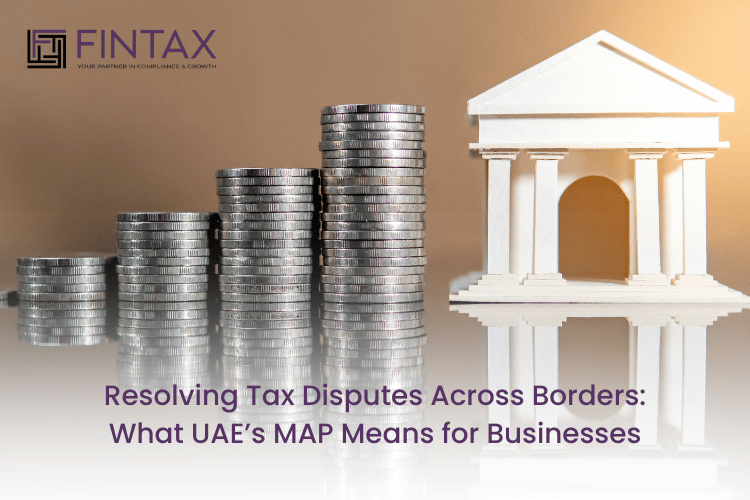Resolving Tax Disputes Across Borders: What UAE’s MAP Means for Businesses
German FinTax
July 2, 2025

As a significant step towards strengthening its international tax framework, the United Arab Emirates (UAE) has officially issued Mutual Agreement Procedure (MAP) guidance in June 2025. This move signifies the UAE’s strategic aim to enhance its adherence to international tax standards and provide more straightforward, more certain rules for businesses involved in cross-border transactions.
What is MAP?
Under double taxation avoidance agreements (DTAs), the Mutual Agreement Procedure (MAP) is a dispute resolution mechanism. It enables the competent authorities of two jurisdictions to hold discussions to resolve disputes over the interpretation or application of tax treaties. This way, taxpayers can seek relief from double taxation by facilitating negotiations between tax authorities, often avoiding lengthy and costly domestic litigation.
MAP typically addresses issues such as:
– Transfer pricing adjustments
– Dual tax residency disputes
– Allocation of profits to permanent establishments
– Challenges with withholding tax
Importance of MAP in the UAE Context
With the UAE’s tax landscape changing, particularly since Corporate Tax in UAE was introduced in June 2023, the release of MAP guidance is especially timely. As UAE-based businesses take on more international transactions, the risk of double taxation and treaty-related disputes increases.
This aligns with the UAE’s commitment to the OECD’s BEPS Action 14, which promotes timely and effective dispute resolution through mechanisms like MAP.
By introducing a structured MAP framework, the UAE strengthens its pledge to:
– Comply with the OECD’s BEPS (Base Erosion and Profit Shifting) standards
– Establishing a more transparent and investor-friendly tax regime
– Align itself with international best practices to support global trade and investment
Key Features of the UAE’s MAP Guidance
The UAE Ministry of Finance has published new guidance on the framework, eligibility, and process for starting and completing MAP cases. Key points include:
1. Eligibility and Applicability
The MAP is available for disputes over the interpretation or application of provisions in tax treaties signed by the UAE. If taxpayers think that the actions of one or both treaty jurisdictions lead to taxation not in accordance with the provisions of the applicable treaty, they can request MAP assistance.
2. Initiating a MAP Request
Taxpayers must submit a formal written request to the UAE Competent Authority within the time limits set out in the relevant treaty—usually within three years from the date of the first notification of the action that led to the dispute.
When making a request, the submission should include:
– A description of the issue
– Relevant treaty articles that are involved
– Details of any transactions or adjustments
– Supporting documents and evidence
3. Review and Assessment
Once a MAP request has been submitted, the Competent Authority will review the application to determine whether it is admissible. If the application is accepted, the Authority may start discussions with the treaty partner to resolve the issue amicably.
4. Outcomes and Implementation
Once an agreement is reached, the Competent Authority will take the necessary steps to implement the solution, including tax refunds, changes to tax assessments, or relief from double taxation. The taxpayer must agree to the resolution and waive their right to pursue other remedies, where applicable.
5. Non-Binding Nature
MAP is not a litigation process, but rather a negotiation between competent authorities. Although it may not always lead to a favourable outcome for the taxpayer, it provides a diplomatic and efficient alternative to lengthy tax disputes. The MAP resolution is binding on the authorities if accepted by the taxpayer, but the taxpayer may reject the outcome and pursue other remedies.
Benefits for Multinational Businesses
Introducing formal MAP guidance in the UAE brings several benefits to multinational enterprises (MNEs) and cross-border investors:
– Certainty: Businesses now have a straightforward way to settle tax disputes without legal battles.
– Time Efficiency: MAP often resolves issues more quickly than litigation, especially in jurisdictions with slower judicial systems, saving time and resources.
– Reduced Risks: Companies can lower the risk of double taxation, which could otherwise affect their profitability and competitiveness.
– Enhanced Reputation: It boosts the UAE’s reputation as a business-friendly place that follows global tax governance standards.
A Strategic Step in UAE’s Tax Evolution
With the release of the MAP guidance, the UAE has cemented its reputation as a forward-thinking, globally integrated economy. As the number of DTAs grows and a new corporate tax regime is introduced, the MAP framework provides a valuable addition, fostering trust, transparency, and protection for international taxpayers.
Businesses with cross-border operations now have an extra layer of security when dealing with complex tax issues. As global tax compliance becomes increasingly complex, access to mechanisms like MAP can be a vital strategic advantage.
The MAP guidance further supports the UAE’s efforts to meet international tax cooperation standards and enhance its attractiveness as a global business hub.
How German Fintax Consultancy Can Help
At German Fintax Consultancy, we recognise the intricacies of international taxation and the hurdles businesses encounter in cross-border transactions. With the UAE’s MAP framework now in place, our team is well-positioned to assist clients in:
– Evaluating eligibility for MAP based on specific treaty provisions
– Preparing thorough MAP submissions, including supporting documents
– Communicating with the UAE Competent Authority on your behalf
– Offering strategic guidance on transfer pricing, tax treaty interpretation, and risk mitigation
– Ensuring compliance with deadlines, legal obligations, and procedural requirements
Whether you’re a multinational facing potential double taxation issues or an entity based in the UAE expanding globally, German Fintax Consultancy provides expert guidance and comprehensive support to safeguard your business interests.
Recent Post
Categories
Any Question?
About German FinTax
German FinTax Consultancy offers expert solutions in taxation, accounting, and compliance to individuals and businesses across the UAE.
- Dubai, United Arab Emirates
- info@germanfintaxconsultancy.com
- +971 50 667 0856
Quick Links
Copyright © 2025 German FinTax Consultancy. All rights reserved
